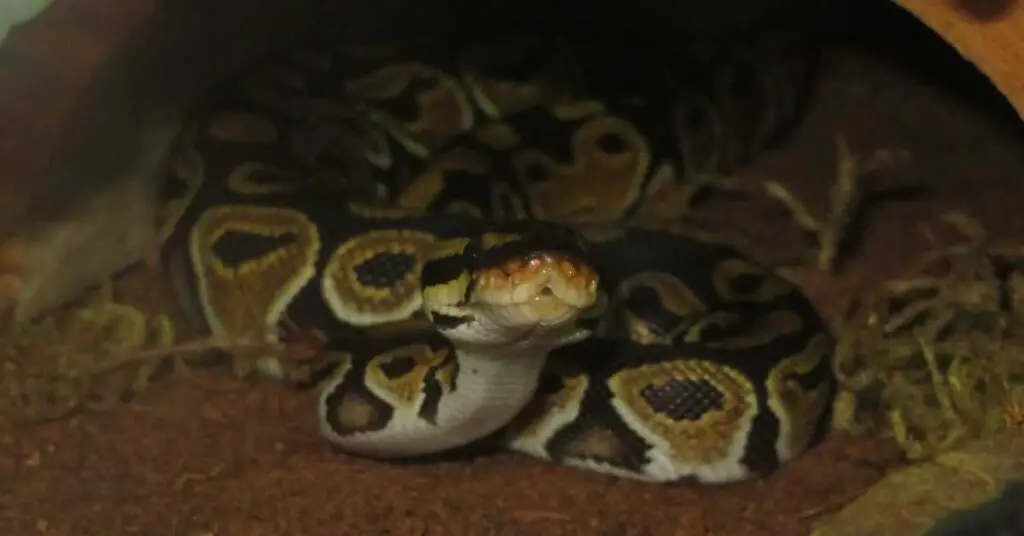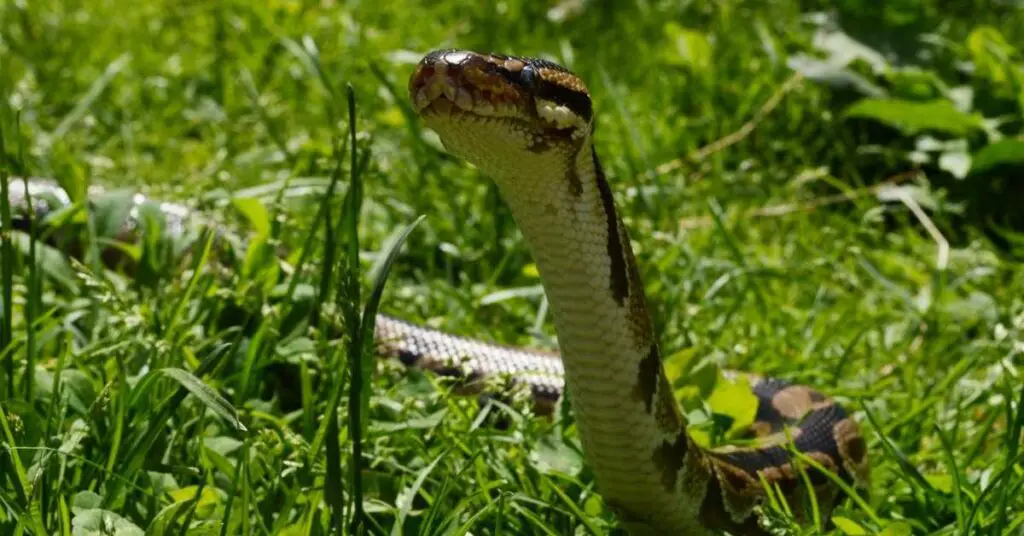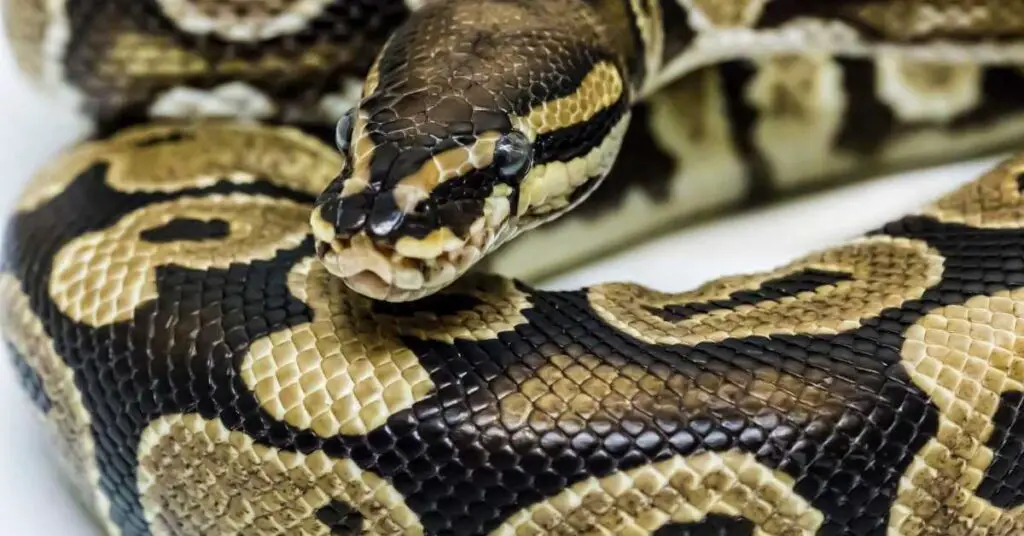We’re an affiliate. We may earn a commission on qualifying purchases through the links on this page. Learn more by reading our disclaimer.
Do ball pythons burrow? Yes, absolutely ball pythons do burrow as a part of their normal behavior. In the wild, ball pythons spend their day on the ground and in burrows to regulate their body heat, stay hidden from potential predators, and just sleep.
This is a question that many people ask, and the answer is yes – ball pythons do bury themselves in the ground. However, they also inhabit other areas of their natural habitat, which we will discuss in this blog post.
We’ll also take a look at some of the other things that ball pythons do in the wild, and how you can create an environment for them in captivity that mimics their natural surroundings.
Do Ball Pythons Burrow?
Yes, ball pythons do burrow in their natural environment in the grasslands of central and western Africa but in addition to that, they also will burrow in captivity.
This is a part of their natural instincts as burrowing helps them avoid predators, provides a moist and warm place to digest their food or shed their skin, and ultimately helps them to feel secure.

Do Ball Pythons Have Burrows?
Yes, ball pythons will either make their own burrow by burrowing down into the leaf mold or loose topsoil or they will find a burrow that is not being used by another animal.
These burrows are typically found near areas with dense vegetation, which provides cover from predators.
The entrance to the burrow is usually just large enough for the snake to fit through, and it is typically lined with leaves or other debris.
Inside the burrow, the snake will coil up and remain hidden for long periods of time.
Do Ball Pythons Make Their Own Burrows?
No, ball pythons do not tend to make their own burrows but rather use burrows that are no longer being used by their original inhabitants.
Ball pythons will gladly use a burrow that was made by a rodent or another animal as a place to bed down for the day.
It is also pretty common for ball pythons in the wild to use old termite mounds, rock piles, and other places where they can get underneath and into a safe place.
Why Is My Ball Python Burrowing?
There can be a variety of reasons why your ball python is burrowing. One of the main reasons is to regulate their body heat.
Ball pythons do not have the ability to regulate their temperature like many other animals do, so they rely on their environment to do this for them.
Burrowing can also help ball pythons hide from potential predators, and gives them a sense of security. They can stay in their burrow until the threat is gone.
Burrowing can also help them digest food more easily and helps them shed their skin in a healthy way because it is a humid place.
Overall, burrowing is normal and healthy behavior for ball pythons – so there’s no need to worry if you see your ball python doing it!

When do ball pythons come out of their burrow?
Ball pythons will typically come out of their burrow during the early morning hours, and then again in the late afternoon/early evening.
This is because the temperature is not too hot or too cold during these times, and it helps them regulate their body temperature.
In addition to regulating their body temperature, they will often hunt for prey during these times.
Do ball pythons need water?
Yes, ball pythons do need water to stay hydrated. In the wild, they will drink from sources of freshwater such as streams or ponds.
In captivity, you should provide your ball python with a bowl of clean water that is changed daily.
They may also drink from their bowl while bathing, so it’s important to keep an eye on the water level and make sure that it doesn’t get too low.
Why Does My Ball Python Burrow Under His Water Bowl?
It is incredibly normal for a ball python to hunt for a space that is just big enough to squeeze in and curl up.
They like spaces like this as they help them feel secure. Ball pythons also like to get into or underneath the water bowl as it tends to be more humid.
Do Ball Pythons Need Humidity?
Yes, ball pythons do need humidity in their enclosure. Ball Pythons like their humidity levels between 50 and 60%. If you are able to maintain your humidity constant, your ball python will do great.
You can increase the humidity in your ball python’s enclosure by using a humidifier, misting the enclosure, or using a substrate that retains moisture pretty well such as coconut mulch.

Do ball pythons need a hiding spot?
Yes, ball pythons do need a hiding spot in their enclosure. This can be something as simple as a cardboard box or an upturned flower pot.
Hiding spots are important for ball pythons because it gives them a place to feel secure, and can help reduce stress levels. It is also a place where they can go to regulate their body temperature.
If you want to get an incredibly accurate reading of the ball python’s enclosure or of the snake itself, you can use an infrared thermometer.
How Many Hides Do Ball Pythons Need?
A ball python should have at least two hides to use at different times. One of these hides should be on the cool side of the enclosure so your ball python can use it to cool down when it is too hot.
Likewise, the other hide should be on the warm side of the enclosure so that your python can get warm when he or she needs to. You can fill these hides with sphagnum moss to help in the shedding process.
Frequently Asked Questions (FAQs)
Here are some of the most asked questions:
Do Ball Pythons Live In Trees?
In their natural habitat, ball pythons will spend most of their time on the ground or in burrows. They will only climb trees if they need to, such as to escape predators or the heat.
Ball pythons are not arboreal animals, which means they do not live in trees. They are terrestrial animals, which means they live on the ground.
In Conclusion
So, there you have it. Yes, ball pythons do burrow and spend most of their day in the burrow until it is either dusk or dawn when they come out to find a bite to eat.
If you are considering adding one of these fascinating creatures to your family, be sure that you can provide them with a suitable place to live and hide.
Thanks for following along on our journey into the world of ball python behavior!

